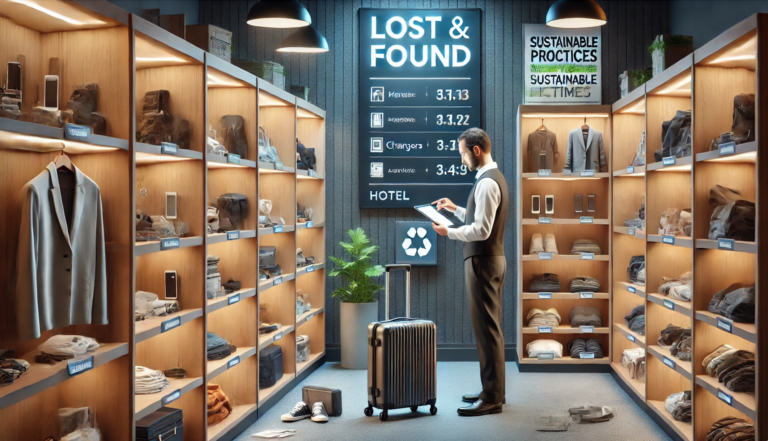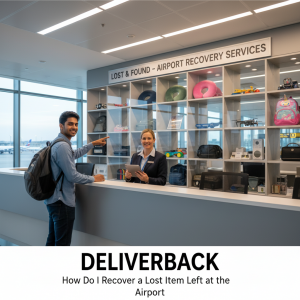For hotels, managing lost and found items efficiently is a vital yet often overlooked aspect of operations. With guests frequently leaving behind belongings, the hotel’s lost and found storage space can quickly become cluttered. This issue not only takes up valuable storage room but also creates extra work for the housekeeping and front office teams who manage these items. A clear, effective lost and found policy is essential for both operational efficiency and guest satisfaction.
In line with these needs, Deliverback has introduced a new feature that enables hotels to better manage and declutter their lost and found inventory. This innovative tool helps hotels identify items that have been stored for an extended period, allowing them to make informed decisions about recycling, donating, or discarding them. This not only frees up space but also supports sustainability initiatives within the hospitality industry. In this post, we’ll explore how hotels can benefit from an organized lost and found system, the importance of inventory management, and how Deliverback’s new feature can make a real difference.
The Challenge of Lost and Found Management in Hotels
Hotels handle a significant volume of lost and found items, from phone chargers to clothing, and sometimes even valuable belongings like jewelry or electronics. Typically, these items are stored for a set period (often ranging from a few months to a year) in case the owner returns to claim them. However, without a proper system, this inventory can quickly become unmanageable, leading to the following challenges:
1. Cluttered Storage Areas: Over time, unclaimed items can pile up, occupying valuable storage space that could be used for more immediate needs.
2. Increased Operational Costs: Managing these items—cataloging, storing, and maintaining records—requires staff time and resources, increasing the operational burden on hotels.
3. Reduced Efficiency: When lost and found storage spaces are cluttered, it becomes harder for staff to locate and retrieve items, impacting efficiency and delaying resolutions for guests who do return to claim their belongings.
4. Missed Opportunities for Sustainability: Many items in lost and found storage go unclaimed indefinitely. Without a structured way to process these items, hotels miss the chance to donate or recycle them, which could align with sustainability goals.
Deliverback’s new feature aims to solve these challenges, making lost and found management more efficient and environmentally friendly.
The Benefits of a Structured Lost and Found Policy
An effective lost and found policy can significantly enhance the guest experience and streamline operations. Here’s why hotels should invest in such a policy:
- Enhanced Guest Satisfaction: A swift and organized response to guests who inquire about their lost items demonstrates excellent service. This can lead to positive reviews, repeat visits, and increased guest loyalty.
- Operational Efficiency: With a clear policy and structured system in place, staff can manage lost items more efficiently, reducing the time spent on administrative tasks related to the lost and found.
- Cost Savings: By minimizing the storage of unclaimed items, hotels can reduce storage costs and focus their resources on more critical areas of their business.
- Sustainability: Hotels with a proactive approach to unclaimed items can align their policies with sustainable practices. By recycling, donating, or disposing of items responsibly, hotels contribute to environmental preservation.
Introducing Deliverback’s New Inventory Feature – A New Approach for Hotels to Streamline Operations and Increase Sustainability
Deliverback’s latest feature takes lost and found management to the next level. This new tool allows hotel staff to mark items as “old” based on a time frame set by the hotel. Here’s how it works and why it’s a game-changer:
Now, items in each location’s inventory can be marked as “old”! For example, if six months have passed since an item was created, users can easily identify it and take the necessary actions concerning the “digital” stock in Deliverback. They can also literally “discard” items that are taking up space. There is a new option in Settings to set the time horizon.
1. Customizable Retention Period: Hotels can set a specific time frame (e.g., 3, 6, or 12 months) after which items will be flagged as old. This allows for flexibility based on each hotel’s policies and storage capacity.
2. Automatic Notifications for Disposal Options: Once an item is marked as “old,” the system can provide options for disposal, such as recycling, donating to local charities, or safely discarding it. This automated approach helps hotels adhere to sustainability practices without extra manual work.
3. Simplified Inventory Management: By categorizing and labeling items based on their storage duration, hotels can easily track and manage their lost and found inventory. This reduces clutter and helps staff focus on more recent lost items, which are more likely to be claimed by guests.
4. Enhanced Record-Keeping: The feature also helps hotels maintain accurate records of lost and found items, allowing them to track the volume of unclaimed items and make data-driven decisions on storage needs and policy updates
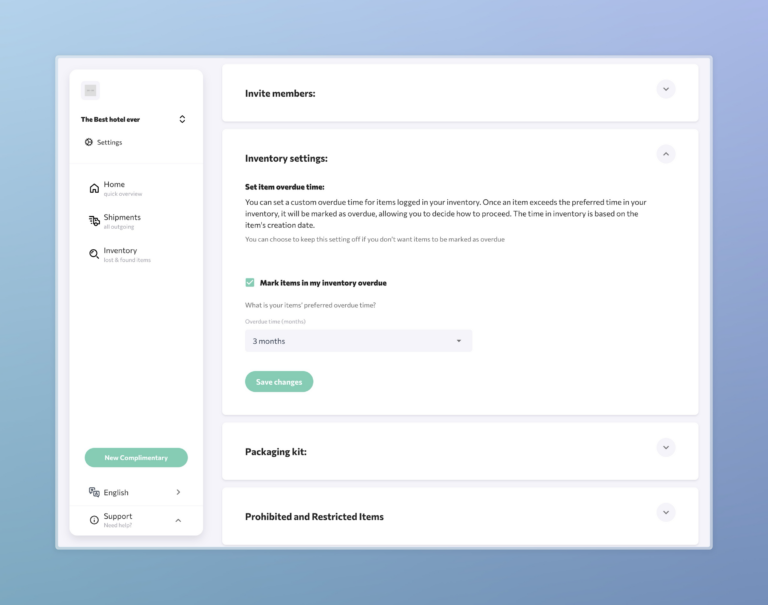
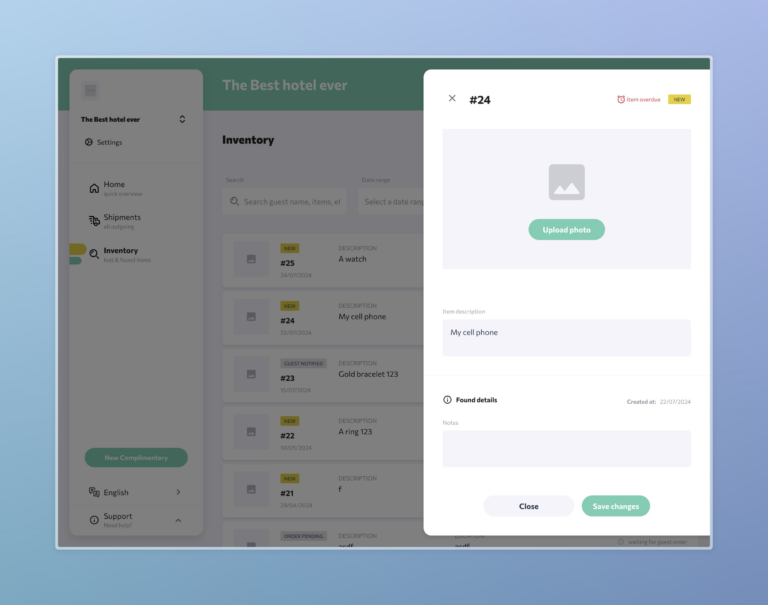
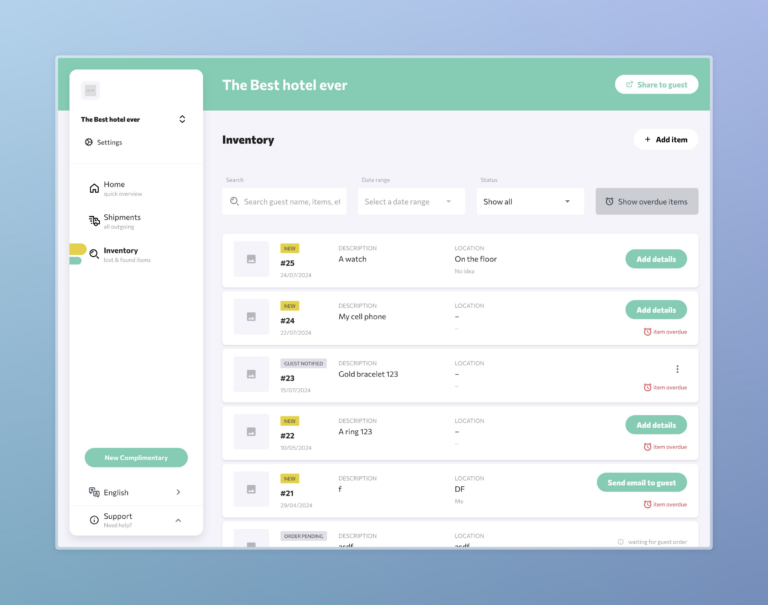
How Deliverback’s Feature Improves Hotel Operations
Deliverback’s new inventory feature provides several tangible benefits for hotels:
- Time Savings: By streamlining the inventory process, Deliverback helps hotels save an estimated 3,000 hours per year that would have otherwise been spent on managing lost and found items. This time can be redirected toward guest services and other essential tasks.
- Cost Reduction: Hotels can save approximately $60,000 annually by reducing the costs associated with handling, storing, and tracking lost items. Additionally, the feature reduces administrative workload by about 40%, allowing hotels to reallocate resources more effectively.
- Boosted Customer Satisfaction: A faster, more organized approach to managing lost items can increase customer retention by 3%. For example, if a hotel has 3,000 guests with lost items annually, a 3% retention boost means an additional 90 loyal customers. With an estimated value of $1,000 per guest, this translates to an extra $90,000 in revenue.
Sustainability in Lost and Found Management
For modern travelers, sustainability is a growing priority, and hotels are finding innovative ways to reduce their environmental impact. Deliverback’s new feature aligns perfectly with this trend by encouraging hotels to recycle or donate unclaimed items rather than discarding them. Here’s how this contributes to sustainability:
- Donation Opportunities: Items such as clothing, chargers, and other everyday essentials can be donated to local charities or shelters, providing value to those in need.
- Recycling Electronics: For items like chargers or small electronics, hotels can partner with recycling programs to ensure that these items are disposed of responsibly, reducing electronic waste.
- Reduced Waste: By periodically clearing out unclaimed items based on the system’s notifications, hotels can avoid stockpiling unnecessary items and minimize the amount of waste sent to landfills.
Implementing the Feature in Your Hotel
Setting up and using Deliverback’s new feature is easy. Here’s a quick guide on how hotels can start benefiting from this tool:
1. Define Your Retention Period: Decide how long you’d like to store items before marking them as old. This may vary based on your hotel’s space, guest volume, and typical item recovery rate.
2. Customize Notification Settings: Enable notifications to alert staff when items are ready for recycling, donation, or disposal. This ensures that items are processed efficiently and that storage remains organized.
3. Train Staff: Ensure that front office and housekeeping staff understand the feature’s purpose and how to use it. With minimal training, they can seamlessly integrate this tool into their workflow.
4. Monitor and Adjust: Use the data generated by the feature to periodically review your lost and found policy. This helps identify trends, such as which items are frequently unclaimed, and can guide policy adjustments over time.
Managing lost and found items doesn’t have to be a time-consuming, costly task for hotels. With Deliverback’s new inventory feature, hotels can enjoy a more efficient, sustainable approach to lost and found management. This innovative tool not only saves time and resources but also enhances guest satisfaction and supports the hotel’s sustainability goals. By taking advantage of this feature, hotels can create a more organized, guest-friendly environment while making a positive impact on the community and the planet.
Together, with solutions like Deliverback, hotels are transforming lost and found management—making it efficient, guest-centric, and environmentally responsible.
